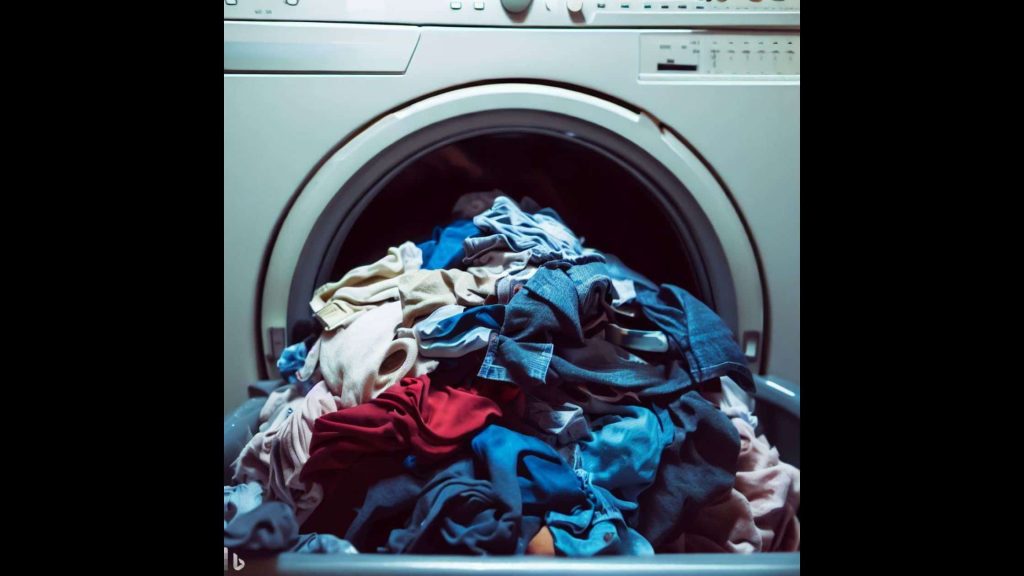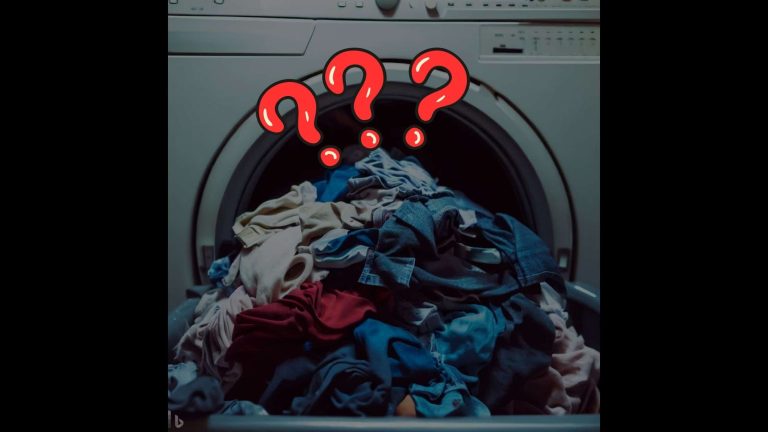Sometimes you just want to lump all your clothes into your washer tub to get your laundry done fast.
Front-load washers generally have larger capacities than their counterpart top-load washers but that doesn’t mean you can load it any how.
You should never overload a front-load washer. Front load washers are designed to handle specific load sizes without causing any damage to the machine or clothes. Overloading a front-load washer can lead to improper cleaning and weakening of the washer shock absorbers and bearings.
In this article, we have explained why you should not overload your front-load washer and provided tips to properly it without causing any issues to your washer or clothes.
Table of Contents

Can You Overload A Front Load Washer?
Overloading your washer can cause several issues, including poor cleaning performance, damage to the machine, and even safety hazards.
So, it’s important to know the right amount of laundry to load into your washer to avoid these problems.
Most front-load washers come with a manufacturer’s recommendation for the maximum weight of laundry that can be loaded.
You can find this information in the user manual or on the label inside the washer’s door. Generally, front-load washers can handle between 4 to 20 pounds of laundry, depending on the capacity.
When you overload your front load washer, the clothes won’t get shuffled, and the drum won’t be able to slap them evenly. As a result, the clothes won’t get cleaned properly, and you may end up with dirty laundry even after a wash cycle.
Ideal load size for front load washers
It’s important to load your front load washer properly to ensure that your clothes come out clean while preserving your washer at the same time.
The table below shows different types of front-load washers and the maximum loads.
| Machine Type* | Cubic Feet | Pounds of Laundry Per Load |
|---|---|---|
| Compact | 1.5 to 3.4 | 4 to 8 |
| Standard | 3.5 to 4.4 | 12 to 16 |
| Large | 4.5 to 5.0 | 16 to 20 |
| Extra-Large | 5.1 to 6.2 | 20 to 25 |
You can always weigh your clothes using a clothes weight scale.
But here is a table of how much some clothes weigh in general:
| Fabric Type | Weight(oz) |
|---|---|
| T-shirt | 3 to 7 |
| Jeans | 10 to 13 |
| Medium Sweatshirt | 16 to 25 |
| One Full-Size Bed Sheet | 10 to 28 |
| Bath Towel | 1.5 to 5 |
How full can you load a front-load washer?
As a general guideline, you should avoid overloading the washer to ensure proper cleaning and avoid potential damage to the machine.
A good rule of thumb is to fill the drum with clothes in a way that allows them to move freely and have enough space for water and detergent to circulate effectively.
For most standard front-load washers, a full load might be around 3.5 to 5 cubic feet or approximately 12 to 16 pounds of laundry.
Always ensure you are not exceeding the capacity of your washer.
What happens if you overload a front-load washer?
Overloading a front-load washer can have several negative consequences, both for your washing machine itself and for the quality of the laundry.
Here are some of the potential issues that can arise from overloading:
- Ineffective Cleaning
When the drum is overloaded, clothes don’t have enough space to move freely. As a result, detergent and water may not reach all areas of the clothes, leading to incomplete or inadequate cleaning. - Wear and Tear of washer parts
Overloading puts additional strain on the washer’s motor, bearings, and shock absorbers. The extra weight can cause increased friction and stress, potentially leading to premature wear and tear on your washer and reducing its lifespan. - Imbalanced Loads causing vibrations
An overloaded washer is more likely to experience balance issues during the spin cycle. If the load becomes imbalanced, the machine may shake violently, make loud noises, and potentially even move around, posing a safety risk and potentially damaging the washer. - Longer Washing Times
The washer’s sensors may detect the overload and adjust the cycle, resulting in longer washing times to try to compensate for the insufficient water and detergent distribution. - Water and Energy Waste
An overloaded washer may require extra rinse cycles to remove excess detergent and ensure proper rinsing. This can lead to unnecessary water and energy consumption. - Malfunctions and Breakdowns
Repeatedly overloading your washer can lead to mechanical issues and potentially cause the drum to drop, requiring costly repairs.
Below is an experiment of what happens in an overfilled and overloaded front load washer:
Best tips to avoid overloading your front load washer
If you want to ensure that your front-load washer works efficiently and lasts for a long time, it’s important to avoid overloading it.
Here are some expert tips to help you avoid overloading your washer:
- Know the Washer’s Capacity
Determine the maximum load capacity of your front-load washer in terms of cubic feet or kilograms. This information is usually available in the user manual or washer packaging. - Sort Laundry by Weight
Before loading the washer, sort your laundry by weight. Lighter items like shirts and blouses should be washed together, while heavier items like towels and jeans should be washed separately. - Leave Space for Movement
Avoid packing clothes tightly into the drum. Leave some space to allow the laundry to move freely during the wash cycle. - Don’t Stuff Large Items
Large items like comforters or blankets should be washed individually or with only a few smaller items to avoid overloading the washer. - Run Multiple Loads
If you have a large amount of laundry, run multiple smaller loads instead of trying to wash everything at once. - Perform Maintenance Checks
Regularly inspect and maintain your front-load washer to ensure it’s in good working condition. Malfunctioning machines may not handle loads efficiently, increasing the risk of overloading.
Overloading front load washer FAQs
To know if your front-load washer is overloaded, you should check if the door can close properly. If you have to push or force the door to close, it is a sign that you have overloaded the washer.
Overloading a front-load washer can cause it to leak. When you overload the machine, the drum can become unbalanced, causing excessive vibration that can loosen certain watertight connections and cause leaks.
References:
Related Articles:

